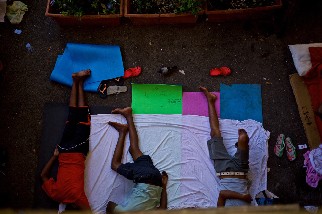Taking an Evidence-Based Approach to Refugee Health
Editor’s Note: The full collection of information and evidence summarized in this post is available through Evidence Aid’s resource, “The Health of Refugees and Asylum Seekers in Europe.” In 2015, over one million people arrived in Europe by sea, mostly originating from Syria. In the same year, 3,771 people went missing or died attempting to […]

Editor’s Note: The full collection of information and evidence summarized in this post is available through Evidence Aid’s resource, “The Health of Refugees and Asylum Seekers in Europe.”
In 2015, over one million people arrived in Europe by sea, mostly originating from Syria. In the same year, 3,771 people went missing or died attempting to reach safety in Europe. In 2016, people continued to make the hazardous journey across the sea, and at the beginning of Februar,y 67,072 people made it across, while 357 were reported dead or missing. Source: UNHCR
Many of those who do reach Europe, across the sea or otherwise, continue to face threats to their health and security. In their attempt to reach countries of asylum, they are forced to endure inadequate shelter and sanitation, and lengthy multi-day walks and waits at borders in adverse weather conditions.
 While some of them suffer from chronic medical conditions that go unattended, others are pregnant without access to prenatal care. Many of the refugees and asylum seekers are children, some with respiratory infections. Others suffer from mental trauma related to the conflict and persecution they are fleeing from. The fear of repatriation or detention and bureaucratic hurdles makes them potentially wary of seeking healthcare. The London School of Hygiene and Tropical Medicine published “On the move: the race to keep forced migrants healthy”, that looks at some of the health consequences for refugees and asylum seekers of being on the move.
While some of them suffer from chronic medical conditions that go unattended, others are pregnant without access to prenatal care. Many of the refugees and asylum seekers are children, some with respiratory infections. Others suffer from mental trauma related to the conflict and persecution they are fleeing from. The fear of repatriation or detention and bureaucratic hurdles makes them potentially wary of seeking healthcare. The London School of Hygiene and Tropical Medicine published “On the move: the race to keep forced migrants healthy”, that looks at some of the health consequences for refugees and asylum seekers of being on the move.
Those refugees and asylum seekers who do access some kind of healthcare present medical staff in Europe with several challenges. Whilst some of these challenges are not related to their medical conditions, such as language barriers and cultural differences, others are medical or public health related and, if possible, should be attended to with an evidence-based approach.
 The information and collection of evidence within the Evidence Aid resource aims to provide those addressing the health of refugees and asylum seekers with some guidance. The collection of evidence is divided between the sources mentioned below and a Cochrane Library Special Collection, housed in the Cochrane Library. Both collections of evidence focus on some of the most relevant medical conditions as perceived by experts who have been involved either in guideline development or on the frontline, directly addressing the needs of refugees and asylum seekers. In the first instance, the collaboration (see below) decided on the following priority conditions to address in the Special Collection (however, this may be expanded at a later date):
The information and collection of evidence within the Evidence Aid resource aims to provide those addressing the health of refugees and asylum seekers with some guidance. The collection of evidence is divided between the sources mentioned below and a Cochrane Library Special Collection, housed in the Cochrane Library. Both collections of evidence focus on some of the most relevant medical conditions as perceived by experts who have been involved either in guideline development or on the frontline, directly addressing the needs of refugees and asylum seekers. In the first instance, the collaboration (see below) decided on the following priority conditions to address in the Special Collection (however, this may be expanded at a later date):
- Common Mental Health Disorders (including PTSD and depression)
- Vaccine Preventable Diseases
- Skin conditions (including Impetigo, Scabies and Cellulitis)
- Tuberculosis
- Sexual and Physical Violence
This initiative is a collaboration between Cochrane, Wiley, Kevin Pottie, Leo Ho, and Evidence Aid and incorporates the suggestions and contributions of many others. The pictures were provided by Denis Bosnic and were all taken in Italy.
